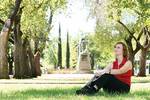Anzac spirit needs to be nurtured
 Landscape Landscape
The Anzac Day march isn't the only Anzac tradition younger generations of Australians should get involved in, according to a PhD researcher at the University of Adelaide. Young Australians also have a role to play in maintaining trees planted in honour of those who have served for their country, said PhD student Sarah Cockerell. Ms Cockerell has been conducting a major national study of "Avenues of Honour" - tree avenues that were planted to serve as memorials to fallen and returning soldiers. At least one Avenue of Honour commemorating the Boer War exists in Australia, in Apsley, Victoria. After the First and Second World Wars, several hundred avenues were planted across the nation. Some - but not many - have followed the Korean and Vietnam wars, and some older avenues have had trees added onto them as further conflicts have arisen. There are currently more than 300 Avenues of Honour throughout Australia, with the earliest known World War I example planted in 1916 in Eurack, Victoria, and the largest to be found in Ballarat. More than half of the avenues can be found in Victoria, with South Australia home to more than 30 of them. "Over the years, many of the avenues around Australia have been lost due to poor management, urbanisation and natural causes. However, the few that remain in good condition form valuable heritage landscapes, with local and national significance," Ms Cockerell said. A large body of research exists on the topic of war memorials, but most investigations have focused on artificial structures - few look at trees or gardens. "The tree is a commonly used symbol of life, as well as the cycle of life, death and renewal. Therefore, it's only natural that trees are used as long-lasting memorials," Ms Cockerell said. In addition to gaining a better understanding of how many avenues exist and what their condition is, Ms Cockerell's research has been looking at: threats posed to urban trees, management practices, the cultural and historical significance of the trees, their horticultural significance, and what the future holds for such memorials. She is also looking into the problems associated with replacing dying or diseased trees. "If avenues are completely replaced, what significance do the new trees inherit from the old? Do the trees only have significance because of their age, or can historical value transfer from the old to the new? These and many other issues need to be considered," Ms Cockerell said. Ms Cockerell said the role of the community was crucial if Avenues of Honour were to survive as long-lasting memorials. "These avenues were almost always planned, organised, paid for, and planted by local community groups. They symbolise a community's grief over the losses of war as well as the community's pride in their people and their town. "The survival of Avenues of Honour is very much dependent on the value placed on them by local community groups, including schools, churches, RSL branches, and local councils. "Whenever community support fades from lack of interest or the fading of community memory, the trees are in greatest danger. "New generations of Australians have a role to play in better understanding the Avenues of Honour in their area and helping to maintain, restore or renew them - just as young Australians are helping to reinvigorate the all-important Anzac Day marches," she said. Ms Cockerell is a joint student within the School of Earth & Environmental Sciences and the School of Architecture, Landscape Architecture & Urban Design. Story by David Ellis
|





